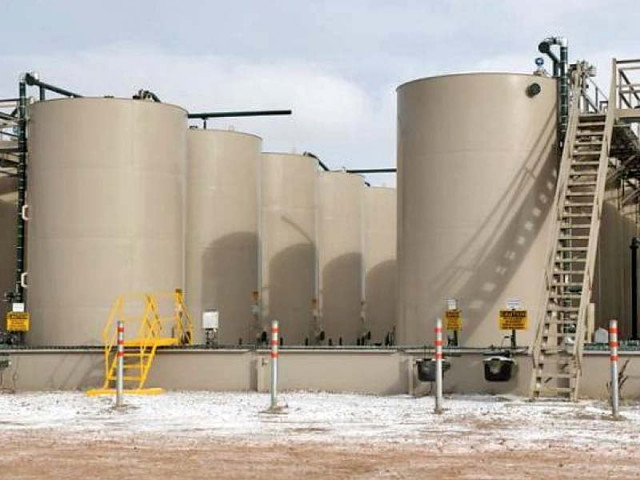After January incident: Build storage facilities to counter fuel shortage, says Abbasi
Says space required to prepare for growing demand, wants higher quality petrol at outlets .

Right now, state-run and private companies can store roughly 250,000 tons of petrol in tanks scattered around the country. PHOTO: REUTERS
Pakistan needs a storage facility that can house at least 100,000 tons of petrol to counter the sudden spike in demand like the one in January, which adversely affected the country, said Petroleum Minister Shahid Khaqan Abbasi on Saturday.
Right now, state-run and private companies can store roughly 250,000 tons of petrol in tanks scattered around the country.
As a regulator and majority stakeholder in the country’s largest petroleum marketing company - Pakistan State Oil, the government has a responsibility to maintain supply chain but private sector must also play its part, he said.
“The way petrol consumption has gone up is unprecedented. We need storage facilities, terminals and retail outlets,” he said, speaking at a ceremony held to mark the two storage depots being built by Admore in Sindh.
Pakistan being what he called a longitudinal market for petroleum products - where the points of supply like ports are located in the south and bulk consumption taking place up north - makes it all the more important to address the issue of storage facilities.
Abbasi used the event to lay out the expectations of his ministry from the industry not only on adding storage tanks but a wide range of other matters.
The specification of petrol at RON (research octane number) 87 that is still consumed in Pakistan is a matter of concern, he said. “I have asked this so many times but no one has been able to explain why we still use this type of petrol,” he said, addressing the industry executives.
Countries around the world have moved onto petrol grade of RON 92 and above. Most new models of cars are designed for higher-octane gasoline.
Besides damaging the environment, use of RON 87 also impacts procurement cycle of the companies as it not easily available, he said.
Similarly, he said, refineries would need to work on improving quality of diesel. “What we use is not up to the mark.”
Market share concerns
About the criticism that poor policies have resulted in PSO losing its market share to private companies, Abbasi said market share was not the only barometer to judge performance and bottom-line profit should also be considered.
Admore Managing Director Irfan Qureshi, who has spearheaded restructuring of the once struggling marketing firm, reiterated the demand of downstream petroleum industry for upward revision in sale margin.
“We can introduce RON 92 gasoline but there has to be some return on investment. This matter needs to be debated; we need to see if people are ready to pay a higher price for this type of petrol.”
He requested petroleum minister to consider scaling back taxes on petroleum products for the benefit of the industry.
Amir Waliuddin Chishti, chief executive of Admore and head of the Shajar Group of Companies, also announced that the company imported its first gasoline cargo on Saturday.
Admore’s Shikarpur terminal and Daulatpur depot would be able to hold 5,600 tons of petroleum products. Work on the depot is near completion while the Shikarpur terminal would be completed late next year.
Admore is part of Shajar Group, which has stakes in financial services, health care, education and energy industries.
Published in The Express Tribune, August 30th, 2015.
Like Business on Facebook, follow @TribuneBiz on Twitter to stay informed and join in the conversation.



















COMMENTS
Comments are moderated and generally will be posted if they are on-topic and not abusive.
For more information, please see our Comments FAQ